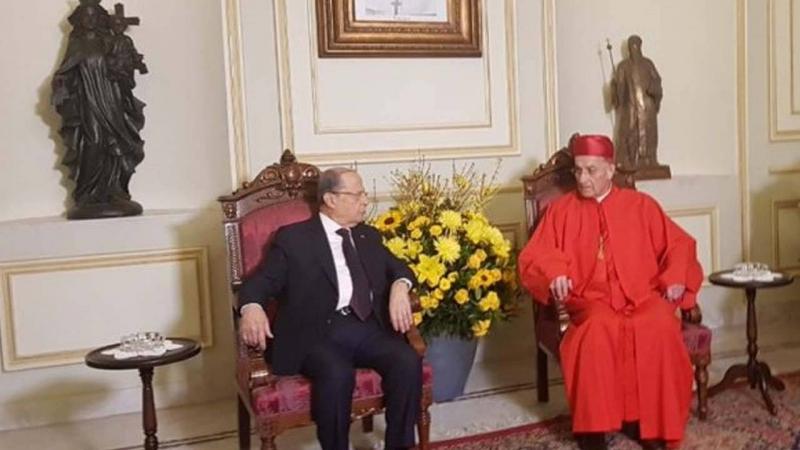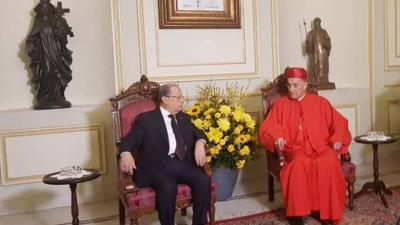The newspaper Asharq Al-Awsat reported that Maronite Patriarch Bechara al-Rai criticized "Hezbollah" over its campaigns against Arab countries, which he described as "stemming from the interests of foreign nations." He criticized its weapons, affirming that reform must accompany the unification of arms and decision-making. This was stated in the presence of Lebanese President Michel Aoun, who also criticized the "Shiite duo," namely "Hezbollah" and "Amal Movement," considering that they had "hindered the investigations in the Beirut Port and judicial formations."
In his Easter Mass yesterday, Raï stated, "True Lebanese do not want an alternative to the state, nor do they want a partner for it. They yearn for the moment when hands are lifted off Lebanon, dominance wanes, coercion falls, politicization of the judiciary and administration by the influential comes to an end, duality is eliminated, and the national interest prevails over all private and electoral interests... so that there remains only one republic, one legitimacy, one weapon, one decision, and a unified Lebanese identity."
He addressed President Aoun, saying that Pope Francis's visit to Lebanon next June "is like a bridge between your term and that of your successor." He added, "All Lebanese are relieved to confirm that elections will take place as scheduled, and your resolve regarding them has been steadfast despite attempts to overthrow them from here and there," noting, "This very same resolve is what you will work with to ensure the election of your successor at the head of the republic on the constitutional date."
Raï said, "Everyone appreciates your efforts aimed at approving the general budget and agreeing on a recovery plan, and at enacting reforms as a necessary pathway for the country's advancement. This includes drafting the contract with the International Monetary Fund after making the necessary adjustments to conform to the Lebanese reality, while taking into account the rights of depositors to their funds, protecting banking secrecy, respecting the specificity of Lebanese society, and the framework of its liberal economy, which has been the secret of Lebanon's growth and prosperity; it should also consider protecting the freedoms of Lebanese citizens, avoiding adverse effects on investments, and ensuring stable trade exchanges between resident and diaspora Lebanese."
Raï rejected any change to Lebanon's national economic identity, confirming it "does not succumb to any constitutional settlement or political compromise." He criticized Hezbollah's weapons, stating, "Reforms can fully progress, but they need to be accompanied by the state's authority being extended over all its territory, unifying arms and decision-making, in accordance with Security Council resolutions, and adopting strategic choices that strengthen Lebanon's relationships with its Arab surroundings and the democratic world."
He added, "As Gulf countries gradually return to Lebanon to contribute to its revival, it is essential to respect the sovereignty of nations and maintain good relations with them, halting the campaigns against these sister countries, especially since such campaigns are unrelated to Lebanon's interests but rather to the interests of foreign nations."
Raï had held a private meeting with Aoun at Bkirki before the Easter Mass, which lasted for 25 minutes.
Aoun reassured the Lebanese that the parliamentary elections would take place on time, and that preparations for them are in place. He considered the agreement with the International Monetary Fund a positive development that could potentially mark the beginning of Lebanon's emergence from the abyss it finds itself in, alongside the return of Arab nations and its natural sovereignty without any effort.
He accused the "Shiite duo" of obstructing judicial formations related to heads of the Court of Cassation. When asked about the statement from the Finance Minister the day before, which mentioned a "fundamental mistake," Aoun replied, "There is no fundamental mistake, but rather obstruction, and you should know who obstructs it; they must stop lying to you."
In response to what he would say to the families of the Beirut Port victims who tried to meet him, and who still do not know the truth about who exploded their city, he said, "They should direct their inquiries to those obstructing the judiciary, and you all know who the obstructors are. Who stopped the Council of Ministers? Why are you asking questions to which you already know the answer?"




